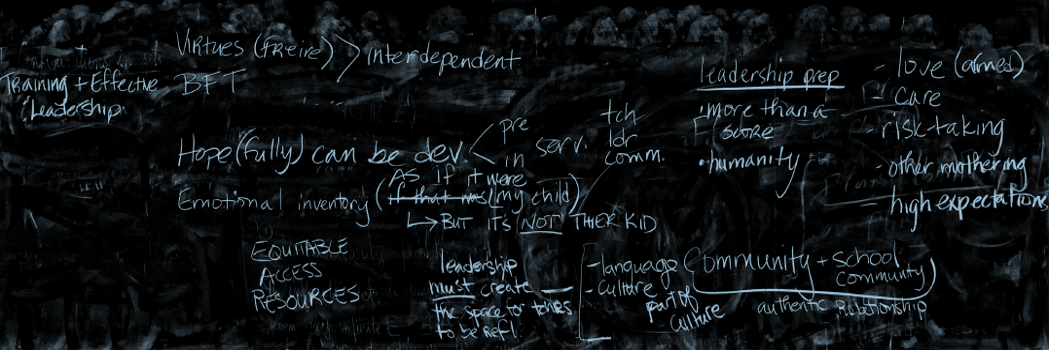A couple of things stood out to me when reading the article this week. First, I was struck by the fact that the IRB didn’t allow Rivera-McCutchen to include “student, parent, and teacher participants in the study” (p. 10). Although she found other ways to include those voices into the study through surveys, I wonder about how much is limited in the scope of research by policies that refuse the inclusion of the voices of those most closely connected to, invested in, and affected by the spaces being researched.
I was also struck by Principal Johnson’s assessment of systemic racism in terms of pedagogy, when he noted that “schools in more privileged and White communities organized student learning in ways that encouraged choice and exploration, while low-income schools in communities of color emphasized standardization and testing” (p. 14). His rejection of standardized testing seemed like a clear and explicit response, and in general his approach was bolstered by the radical care that Rivera-McCutchen defines – which centered on a sense of visionary optimism that allowed him to “strategically navigate a volatile bureaucratic landscape without losing sight of a vision of schooling that is grounded in antiracism and social justice” (p. 23), but then a set of grounded and relational practices when he realized that “encouragement, alone, was insufficient” (p. 21) to realize that vision.
Finally, I was struck by the discussions of teacher resistance to Johnson’s vision for the school. I am wondering how much of that resistance comes from teacher’s own internalized (and racialized) sense of how school should be for their students, and how much came out of a lack of preparation or uncertainty about how to teach in a way that is different from the standardized forms of teaching that are replicated in teacher education programs.
I am left thinking about all of the material and strategic obstacles that work to explicitly get in the way of authentically creating schools that are collaboratively, collectively, and “horizontally” imagined, designed, and evaluated. From the explicit prohibition of including student, teacher, and parent voice in research, to the fact that teacher education programs run separately from principal programs, to the fundamentally vertical hierarchy of school systems, to the creation of policy by folks who are far removed from schools necessitating that individual principals must make decisions outside of that policy on their own, there are so many structures standing in the way. It was exciting to read about the ways that Principal Johnson operated outside of those structures to create a space of radical care for his students and school community. And I am left wondering what it would take to fundamentally dismantle those systemic obstacles.



hi Lucy: I am so happy that you focused on that IRB problem/process, a phenomenon that keeps cropping its nasty head in New York City. Your observation made me think about whom the IRB process is trying to protect–is the students that are being protected or is the system itself? If thoughtful researchers are regularly barred from eliciting the voices of students, families, teachers and principals–as seems to be the case in New York City, where the DOE’s IRB process is notoriously difficult–what is the system trying to protect itself from? Thanks for provoking my thinking in this direction…Fondly, Jane